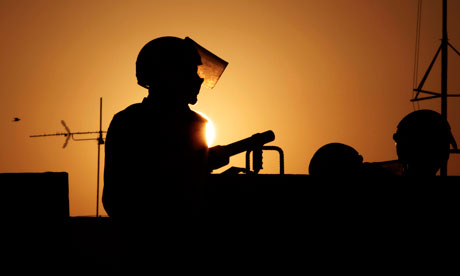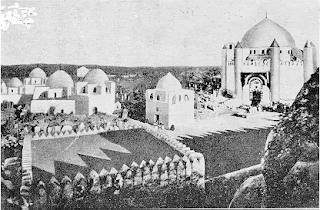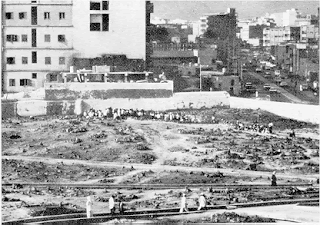Beneath Bahrain's Shia-versus-Sunni narrative, only the tyrants benefit
Through its repressive policies, the regime's long-term goal is to shift Bahrain's demographics: diluting the Shia majority
Maryam al-Khawaja, Guardian.co.uk, October 27, 2012

When you pick up the day's newspaper, it is not likely that you will find much coverage of the ongoing popular revolt in Bahrain. But on the off chance that Bahrain is mentioned, it is almost certain that two words will jump at you: Sunni and Shia. It is even more likely you will see some mention of a Shia revolt against a Sunni monarchy.
This is unfortunate; a very complicated situation is expediently packaged into a soundbite-like myth. That narrative is ahistorical and dangerous because, like all myths, there is a grain of truth to it.
Last year, when Bahrain's revolution began, it was not about sects. Sunnis, Shia along with Bahrain's "sushis" (people of mixed background), non-Muslims, atheists; all came together in Bahrain's version of Tahrir – Pearl Square. Their unifying demand was for a constitutional monarchy to be established in Bahrain. The people were demanding that the king honour his lofty reform promises made when he inherited the position from his Emir father.
This was the third act in a struggle predating the so-called Arab spring. It had started in the 1990s when the people of Bahrain had their own uprising largely forgotten in the west. Then, their demand was a return to Bahrain's more democratic 1973 constitution that gave people a real parliament. Instead, thousands of citizens were arrested and imprisoned. Dozens were killed, many under torture.
In 1999 that cycle was interrupted as Hamad bin Isa al-Khalifa inherited power from his late father amid soaring hopes of reconciliation and reform. His first act was to announce a referendum promising to establish a constitutional monarchy.
Initially, the people celebrated Hamad's break with his repressive father's legacy as many voted in favour of the referendum. They were encouraged by the release of all political prisoners, and the return of political exiles back to Bahrain, and a halt of state-sanctioned torture.
In 2002, borrowing a page from Napoleon Bonaparte's playbook, "Hamad the Reformer" engineered his own monarchic putsch. He amended the constitution, granting himself absolute unchecked powers. A rubber-stamp parliament was then created – half appointed by him and the other half "elected", but with no legislative or monitoring powers.
The farce extended to elections as electoral districts were set up to prevent the opposition from ever making significant gains. As a result, if the leading opposition group got 60% of all votes, the new re-districting made it so that they would win only 18 out of 40 seats in the parliament. These measures were at the heart of a comprehensive effort to marginalise and discriminate against the country's majority population: Shia Muslims.
Bahrain's unwritten laws insidiously establish a quasi-apartheid regime preventing Shias from state-owned housing and many government jobs. For instance, there are entire areas like Riffaa, where Shia are not allowed to rent, buy homes or land.
Ironically, the country's largest employer is none other than the interior ministry and the security forces in charge of protecting the regime. Shia Muslims who, according to the latest numbers provided are about 70% of the population, are not allowed to be employed in them. They justify this through what Bahrainis call "political naturalisation".
For two decades, tens of thousands of people from places like Syria, Jordan, Yemen and Pakistan were expediently granted citizenship in Bahrain. All of them are Sunnis.
The regime is thus resolving two problems. A short-term need is filling the security services with politically reliable elements beholden to the monarchy and not to the nation. The long-term goal is to artificially shift the country's demographics: diluting the Shia majority.
Consequently, newly built government houses go to the politically naturalised, while a regular Bahraini family (Sunni or Shia) has to wait up to 20 years to receive housing. Many Bahrainis sit at home unemployed, while politically naturalised people receive a job immediately upon arrival.
These policies are not fortuitous but part of a deliberate attempt to foment sectarian tensions in society, and to play on the region's geopolitical and sectarian fault lines.
In the past, Bahrain's opposition was "Nasser-socialists before they were dubbed communists". Today they are regarded as Iranian agents and terrorists.
Aided by more than 13 different European and American public relations companies at times, the regime aims to turn its blatant repression into a net asset by capitalising on the fear of the enemy du jour: Shia Iran. At the end of the day the fact remains the same: you can be Shia and loyal to the regime, like Sameera Rajab who is minister of information; and you can be Sunni, sentenced by a military court, tortured and serving time in prison, like Ebrahim Sharif.
Next time you pick up a newspaper remember that the sectarian Shia-versus-Sunni narrative only serves Bahrain's tyrants. That is, of course, if Bahrain is written about at all.
When you pick up the day's newspaper, it is not likely that you will find much coverage of the ongoing popular revolt in Bahrain. But on the off chance that Bahrain is mentioned, it is almost certain that two words will jump at you: Sunni and Shia. It is even more likely you will see some mention of a Shia revolt against a Sunni monarchy.
This is unfortunate; a very complicated situation is expediently packaged into a soundbite-like myth. That narrative is ahistorical and dangerous because, like all myths, there is a grain of truth to it.
Last year, when Bahrain's revolution began, it was not about sects. Sunnis, Shia along with Bahrain's "sushis" (people of mixed background), non-Muslims, atheists; all came together in Bahrain's version of Tahrir – Pearl Square. Their unifying demand was for a constitutional monarchy to be established in Bahrain. The people were demanding that the king honour his lofty reform promises made when he inherited the position from his Emir father.
This was the third act in a struggle predating the so-called Arab spring. It had started in the 1990s when the people of Bahrain had their own uprising largely forgotten in the west. Then, their demand was a return to Bahrain's more democratic 1973 constitution that gave people a real parliament. Instead, thousands of citizens were arrested and imprisoned. Dozens were killed, many under torture.
In 1999 that cycle was interrupted as Hamad bin Isa al-Khalifa inherited power from his late father amid soaring hopes of reconciliation and reform. His first act was to announce a referendum promising to establish a constitutional monarchy.
Initially, the people celebrated Hamad's break with his repressive father's legacy as many voted in favour of the referendum. They were encouraged by the release of all political prisoners, and the return of political exiles back to Bahrain, and a halt of state-sanctioned torture.
In 2002, borrowing a page from Napoleon Bonaparte's playbook, "Hamad the Reformer" engineered his own monarchic putsch. He amended the constitution, granting himself absolute unchecked powers. A rubber-stamp parliament was then created – half appointed by him and the other half "elected", but with no legislative or monitoring powers.
The farce extended to elections as electoral districts were set up to prevent the opposition from ever making significant gains. As a result, if the leading opposition group got 60% of all votes, the new re-districting made it so that they would win only 18 out of 40 seats in the parliament. These measures were at the heart of a comprehensive effort to marginalise and discriminate against the country's majority population: Shia Muslims.
Bahrain's unwritten laws insidiously establish a quasi-apartheid regime preventing Shias from state-owned housing and many government jobs. For instance, there are entire areas like Riffaa, where Shia are not allowed to rent, buy homes or land.
Ironically, the country's largest employer is none other than the interior ministry and the security forces in charge of protecting the regime. Shia Muslims who, according to the latest numbers provided are about 70% of the population, are not allowed to be employed in them. They justify this through what Bahrainis call "political naturalisation".
For two decades, tens of thousands of people from places like Syria, Jordan, Yemen and Pakistan were expediently granted citizenship in Bahrain. All of them are Sunnis.
The regime is thus resolving two problems. A short-term need is filling the security services with politically reliable elements beholden to the monarchy and not to the nation. The long-term goal is to artificially shift the country's demographics: diluting the Shia majority.
Consequently, newly built government houses go to the politically naturalised, while a regular Bahraini family (Sunni or Shia) has to wait up to 20 years to receive housing. Many Bahrainis sit at home unemployed, while politically naturalised people receive a job immediately upon arrival.
These policies are not fortuitous but part of a deliberate attempt to foment sectarian tensions in society, and to play on the region's geopolitical and sectarian fault lines.
In the past, Bahrain's opposition was "Nasser-socialists before they were dubbed communists". Today they are regarded as Iranian agents and terrorists.
Aided by more than 13 different European and American public relations companies at times, the regime aims to turn its blatant repression into a net asset by capitalising on the fear of the enemy du jour: Shia Iran. At the end of the day the fact remains the same: you can be Shia and loyal to the regime, like Sameera Rajab who is minister of information; and you can be Sunni, sentenced by a military court, tortured and serving time in prison, like Ebrahim Sharif.
Next time you pick up a newspaper remember that the sectarian Shia-versus-Sunni narrative only serves Bahrain's tyrants. That is, of course, if Bahrain is written about at all.

